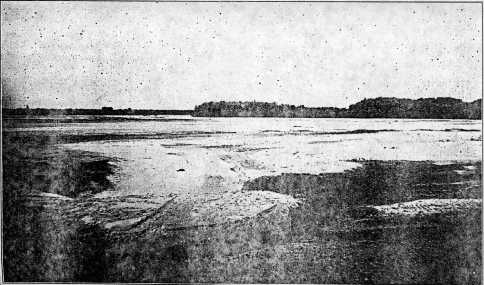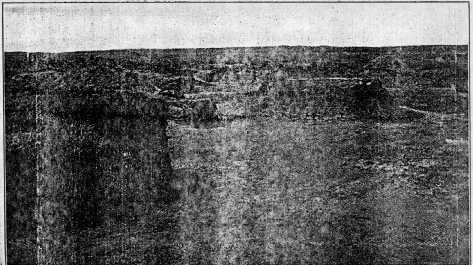|
16 |
|

Junction of Loup River with the Platte, near present city of Columbus, Nebraska. Photo July, 1923.
|
|
17 |
|
14 |
|
The lieutenant general having assembled all the officers on duty and on leave, and the natives, told them that a savage had reported to him that he had found some branches and leaves of fresh sand cherries which seemed to be the fragments of a meal of some band which had passed very recently. He then gave an estimate of the distance we had traveled, which in our reckoning was about 300 leagues. He then took counsel whether we should wait for orders from the Viceroy of New Spain, who had sent the detachment to discover from the savage nations if any French had established themselves in the region, or whether, since we had thus far found no proof of such establishment, we should continue our search with the Panane30 nation (the only one which could give light on the question) and how we should communicate with them.
Names of Spanish Officers.
The military council was composed of Captain
Thomas Aulguin, Aide-de-camp Joseph Domingue, Ensign Bernard
Cazille; Captains Manuel Theverio de Albas, Alonzo Reald, Pierre
Lucan; Corporals Joseph Gregoire, Manuel Thenonorio de Alba,
Laurent Rodrigue; Captain Christophe de la Serne31 and
Captain Jean Arhive; these two last named are natives.
All were of opinion that we ought to find the
Panane in order to learn from them the truth or to know whether
the Apaches had deceived us--that for this purpose the detachment
should cross the river and thereafter proceed in the best way to
carry out the plan proposed.
Crossing Great River Full of Islands.
Upon this resolve the lieutenant general
ordered certain savages to locate the ford of the river so that
the detachment might cross to the other shore. In the afternoon we
began to carry over the baggage on travois upon the backs of the
savages. It was not possible to get it across otherwise. The great
number of islands in the river makes navigation by boats
absolutely impracticable. Since one day did not suffice to
transport everything our camp was divided that night by the river.
Besides we did not wish to expose our natives by crossing at
night, because it was so cold.
* See notes by Addison E. Sheldon on pages 29-31.
|
|
15 |
Wednesday 7 of August.
At the break of day we. crossed over the remainder of our baggage and people to the other side of the river of Jesus-Maria. This was not without much trouble, but at last we found ourselves together at noon.
Thursday 8.
We leave the river Jesus-Maria following the trail of the Panane. The native Captain Serne boasted that he knows the trail well. He lost his way, however, and came back to camp. He was sent out again and with him Captain Joseph Narvanno, four corporals and two soldiers. A servant of Captain Serne, Panane by nation said that he remembered although he had left it when very young, that the village of his tribe was located on the bank of a river far to the north. Our soldiers were ordered to find out the truth of his statement. They were ordered at the same time when they were near the village to let the savage talk alone with his people, to tell them they had nothing to fear, that we were Spaniards, their friends. And in case they found no one in the village to go such distance as would enable them to return to camp the same day or ensuing night.
Another Large Stream Crossed.
Since we left the river Jesus-Maria we have taken care to follow the trail which we found before us and which we believe was made by the Panane. We found, at a league from the river a large creek which it was necessary to cross and we thought from the water which was very warm that it was a branch of the river whose course was from west to east. We then marched over a plain, following always the trail of those who had gone before us. We saw a number of trees a league away and we met one of our savages who was of Captain Narrans detachment and who had orders to wait for us to tell us to follow the creek and that he would follow the trail of those gone ahead since they found no one in the villages. The camp arrived at the bank of the creek and, as it was impossible to cross with our arms, we were obliged to keep along its bank and follow the same route as that taken by Captain Narrans. We had already traveled three leagues to reach the creek; we marched three more to arrive at a plain. Finally we halted in order that those following might not lose the way. At the same time two savages arrived from Captain Narrans to tell the lieutenant general that he should not worry if the captain did not return to camp that ensuing night, that he, was following the trail of the Panane who, ac-
|
16 |
|

Junction of Loup River with the Platte, near present city of Columbus, Nebraska. Photo July, 1923.
|
|
17 |
cording to all indications, were not far off, and that the main command might march since he counted on rejoining them very soon.
Friday 9.
The camp being ready to march we saw, at more
than a league's distance, some one approaching at a gallop. We
were in advance and we found that it was one of our people who had
been at the discovery. They told us that, eight leagues distant,
on the other side of the creek we were following, thy (sic) found
the Panane in a bottom, singing and dancing according to custom of
the savages. They seemed to be in great numbers. They had not
judged it wise to approach nearer to them for fear of frightening
them away during the night.
Upon this news order was at once given to cross
to the other side of the creek. It was carried out with so much
good fortune that everything went over without getting wet,
although the mules were up to their girths in the water. We
marched three leagues along the creek and found it convenient to
halt at five leagues distant from the tribe, according to the
report of those who brought in the news.
Council with Panane or Pawnee Nation.
As soon as we were in camp the lieutenant
general sent the savage of Captain Serne to visit and talk with
those of his nation, assuring them of our friendship and good
will, and that we were taking this means of letting them know our
good faith. Although the lieutenant general wished to send two
soldiers with the savage to see that he was not insulted by those
of his nation, the native told him that he had nothing to fear and
that it was better to go alone, that if the soldiers accompanied
him they might believe that there was deception and bad faith in
what he proposed to them. This was agreed to and the savage
started at 11 a. in. to see his nation. May God and the Holy
Virgin, his mother, give him success. The general named the creek
Saint Lawrence. The river Jesus-Maria makes a junction with this
creek at the place where we are, in such manner that if we had not
already crossed it would be impossible to do so.
At 6 p. m. we saw Francois Sistaca, which is the
name of the savage of Don Christophe de la Serne, coming on the
gallop. He related to the lieutenant general and all the others
that he had been to see the band seen dancing the night before
and, not finding it, he had followed the creek and had seen them
crossing to the other side where they had a village and many
people. He stopped at the bank of the creek, dis-
|
18 |
|

Pawnee Village at forks of Beaver Creek and Loup River, near
Genoa, Nebraska, photo 1875.
Photograph furnished by J. W. Williamson, Genoa.
|
|
19 |
mounted, and called to the people crossing the river, making the signs of friendship and peace used by savages. As soon as he was seen many savages came to him and, among others, four at the head of them with tomahawks in hand, without bows or arrows, making cries, and seeing them approach within a stone's throw, he was afraid, made a sign with his cap as though he were calling people back of him and mounting his horse he galloped eight leagues to camp without stopping.
Saturday 10th of the month.
Feast day of the glorious Martyr, Saint
Lawrence (died Aug. 10, A. D. 258). The camp marched along the
river, following the band (of savages) and having discovered on
the other side of the creek a village with a number of houses and.
people passing from one side to the other by a ford, making calls
easily heard because only the creek was between us, we made the
signs of peace and friendship spoken of before. Twenty-five or
thirty savages came to the edge of the creek to talk with us. We
heard easily what they said. The savage of Don Christophe la
Serne, who recognized the language of his nation, told the
lieutenant general that they asked for peace and that he should
come into their village.
They made signs looking at the sun32
which meant that the Spaniards need wait only one day for their
visit. At once the savage of Don Christophe La Serne resolved to
cross over to the other side in spite of the fear he had the day
before. The camp halted opposite the village and the savage took
off his clothing in order to swim across, with consent of his
master. The lieutenant general told him to tell his nation that he
would come and visit them with no design of doing them the least
injury, as they could easily see since he had just discovered them
without any strategems, as he might have done when he learned they
were singing and dancing not more than two leagues distant. Thus
they might confer with us in entire safety for peace and the
friendly union which should exist between brothers and subjects of
the same king. The lieutenant general gave tobacco for the savage
to carry to them, which is the usual custom at these meetings.
© 2000, 2001 for NEGenWeb Project by Ted & Carole Miller